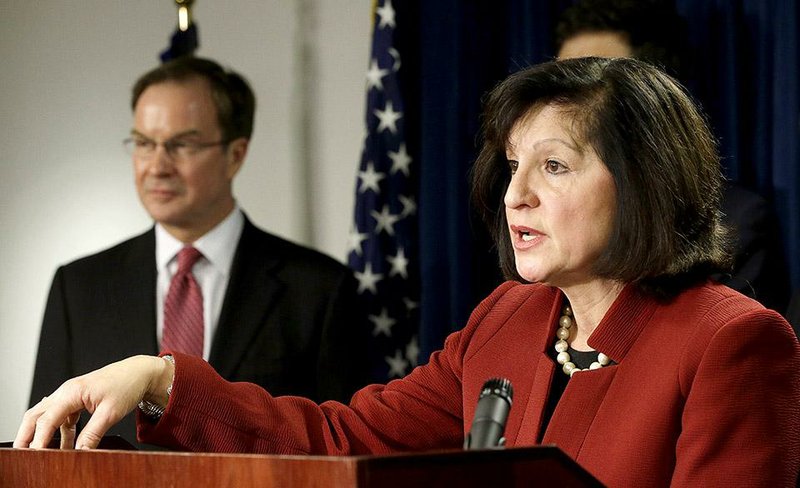Correction: Stuart Delery is an acting associate attorney general. This Associated Press article misidentified the federal official’s job title.
BOSTON -- In the biggest criminal case ever filed in the U.S. over contaminated medicine, 14 former owners or employees of a Massachusetts pharmacy were charged Wednesday in connection with a 2012 meningitis outbreak that killed 64 people.
The nationwide outbreak was traced to tainted drug injections manufactured by the now-closed New England Compounding Center of Framingham.
Barry Cadden, a co-founder of the business, and Glenn Adam Chin, a pharmacist who was in charge of the sterile room, were hit with the most serious charges, accused in a federal racketeering indictment of causing the deaths of 25 patients in seven states by "acting in wanton and willful disregard of the likelihood" of death or great bodily harm.
Among other things, Cadden, Chin and others are accused of using expired ingredients, failing to properly sterilize drugs and failing to test them to make sure they were pure. The other defendants were charged with such crimes as fraud and interstate sale of adulterated drugs.
U.S. Attorney Carmen Ortiz said the facility was "filthy" and failed to comply with even basic health standards, and employees knew it. For example, she said, they falsified logs on when labs were cleaned.
"Production and profit were prioritized over safety," Ortiz said.
More than 750 people in 20 states were sickened -- about half of them with a rare fungal form of meningitis, the rest with joint or spinal infections -- and 64 died. The steroids given were for medical purposes, not for bodybuilding; most patients received the injections for back pain.
In reaction to the outbreak, Congress last year increased federal oversight of so-called compounding pharmacies, which custom-mix medications in bulk and supply them directly to hospitals and doctors.
Linda Nedroscik of Howell, Mich., said her husband, John, survived the tainted injection. But she said the 64-year-old "still struggles, has nightmares."
"It's hard to say it's a relief because it doesn't change anything for us in our physical lives," she said of the indictment, "but it takes a burden off emotionally."
Chin's lawyer, Stephen Weymouth, said he was stunned that prosecutors charged his client with second-degree murder under the racketeering law.
"He feels hugely remorseful for everything that's happened -- for the injuries and the deaths -- but he never intended to cause harm to anybody," Weymouth said. "It seems to be a bit of an overreach."
Messages were left for lawyers for 11 other defendants. Lawyers for two defendants could not immediately be located.
After the outbreak came to light, regulators found a host of potential contaminants at the pharmacy, including standing water, mold and dirty equipment. The business filed for bankruptcy after it was bombarded with hundreds of lawsuits from victims or their families.
Assistant U.S. Attorney Stuart Delery said the defendants showed "not only a reckless disregard for federal health and safety regulations, but also an extreme and appalling disregard for human life."
"Every patient should have the peace of mind knowing that their medications are safe," he said.
Gregory Conigliaro, another co-founder, was among 12 of the 14 arrested at their homes around the state. Chin had been charged with mail fraud in September.
All those charged were expected to make an initial court appearance later Wednesday.
The New England Compounding Center was founded in 1998 by brothers-in-law Cadden and Conigliaro. Cadden earned a pharmacy degree from the University of Rhode Island. Conigliaro is an engineer.
Information for this article was contributed by Jeff Karoub of The Associated Press.
A Section on 12/18/2014
